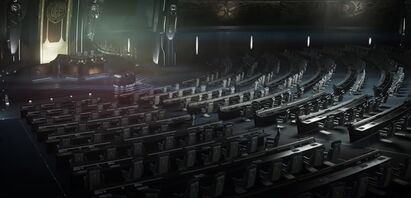The Imperial Senate is one of the Most important buildings of the Empire of Mankind, it is located in Elpida, and alongside the figure of the Emperor, its the seat of the Executive Power in the Empire. It is located in the City of Landras, the second biggest city in the Planet and one of the oldest settlements, situated in the Ashara Continent of Elpida.
Its function is to counterbalance the Power of the Emperor and the Nobility at times, and rule as the Left Hand of the Emperor (being the Nobility its symbolic Right Hand). They are in Charge of Supervising the Application of the Law and the behaviour of the Nobility in their respective territories. It is made to ensure as well, that economic interests are respected for the Citizens and the country as a whole rather than for a specific individual.
The most important task is the application of the Law, the Execution and implementation of it.Rather than deciding what is going to be done, which is mostly decided by the Emperor and sometimes the nobles, their main task is mostly on the "How" is going to be done and implemented, and if the decision actually makes sense and is feasible.
History[]
The Senate was already used as the main location of the Government during the Republic of Elpida and later during the Republic of Anthropos. When the Second Civil War ended, and the Capital was moved to Indara, and renamed the Imperial City, the Senate was kept to prevent mass control by the Emperor, but most of its previous power was reduced and given to other governmental bodies, such as the Legislative Parliament and the Supreme High Court. The Building was known before as "Parliament", the use of the current name as "Senate" was given after the formation of the Empire in 28,648 CE.
The Building has been expanded and modernised to allow for the growing number of senators and other Administration offices to have larger space. The Emperors usually despise the Senate, since its the power balance that stops the Emperor's actions to take place at times. The Political Game always has to dance between the Emperor and the Senate, at least on the Executive side of the Power of the Nation.
Election of Senators[]
Senators can be rich, poor, noble or common citizens but most of the time, only the Aristocracy and the Wealthiest Citizens, also known as the High Bourgeoisie of the nation, can apply to it due to the fact that Senators are elected among those who can afford their own electoral campaigns. The figure of the Senate is slowly becoming a rather symbolic figure, with much of the effective power in hands of the Emperor or the Empress.
The Senate though, still holds important counterbalance power who can be really effective in times of need. The Senate has the power to reject some laws or orders dictated by either the Emperor or the Legislative Parliament. They can as well remove an emperor if he or she is a tyrant or a despot, or if it has committed terrible acts or atrocities or becomes mad.

Senate chamber
Every 4 years, the Citizens of the Empire of Mankind vote for a Senator. Each Estelar system or Group of Systems with an X population, either by themselves or by the joined effort of several systems, vote internally (among the inhabited areas of the System, either Planets, Gas Giants, Asteroids etc...) who is going to be the next senator who represents their interest in the Senate. This Sector (Group of Systems or System) has one representative.
The Senate has two Chambers, the Low Chamber has all the members elected throughout the entire Imperial territory. This means that over 580 000 Senators are located here, one per system (in the most populated ones or one senator per group of systems ( from 2 to up to 100 or more systems to achieved the required population). Then, the High Chamber, its made out of 50 Senators. 25 seats in the High Chamber are reserved for the 25 most populated Systems, another 25 seats are given among the rest of the Low Chamber Senators, taking turns at them so that all get to be in the High Chamber sometime. This last 25 seats rotate every 4 years, when elections in the systems are made so that all systems have a say in the High Chamber from time to time.
